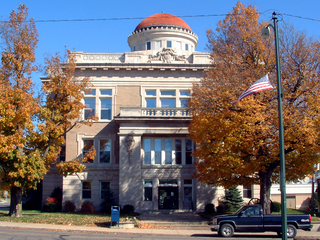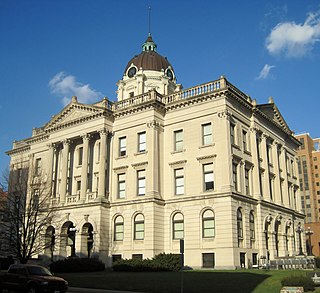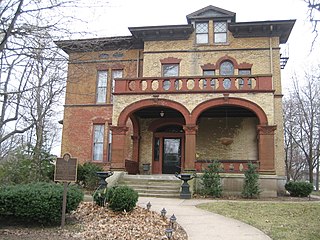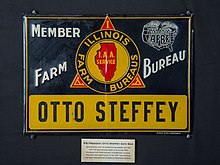
Warren County is a county in the U.S. state of Indiana. It lies in the western part of the state between the Illinois state line and the Wabash River. According to the 2020 census, it had a population of 8,440. Its county seat is Williamsport.

McLean County is the largest county by land area in the U.S. state of Illinois. According to the 2020 Census, it had a population of 170,954. Its county seat is Bloomington. McLean County is included in the Bloomington–Normal, IL Metropolitan Statistical Area.

LaSalle County is a county located within the Fox Valley and Illinois River Valley regions of the U.S. state of Illinois. As of the 2020 Census, it had a population of 109,658. Its county seat and largest city is Ottawa. LaSalle County is part of the Ottawa, IL Micropolitan Statistical Area of Northern Illinois.

DeKalb County is a county located in the U.S. state of Illinois. As of the 2020 United States census, the population was 100,420. Its county seat is Sycamore. DeKalb County is part of the Chicago–Naperville–Elgin, IL–IN–WI Metropolitan Statistical Area.

Bloomington is a city in and the county seat of McLean County, Illinois, United States. The 2020 census showed the city had a population of 78,680, making it the 13th-most populous city in Illinois and the fifth-most populous outside the Chicago metropolitan area. It is adjacent to the town of Normal, and is the more populous of the two principal municipalities of the Bloomington–Normal metropolitan area, which has a population of roughly 170,000. Bloomington is 135 miles (217 km) southwest of Chicago and 162 miles (261 km) northeast of St. Louis. Bloomington is home to Illinois Wesleyan University and the headquarters for State Farm and Country Financial.

The American Farm Bureau Federation (AFBF), more informally called the American Farm Bureau (AFB) or simply the Farm Bureau, is a United States–based 501(c)(5) tax-exempt agricultural organization and lobbying group. Headquartered in Washington, D.C., the Farm Bureau has affiliates in all 50 states and Puerto Rico. Each affiliate is a Farm Bureau, and the parent organization is also often called simply the Farm Bureau.

Texas A&M AgriLife Extension Service was formally established in 1915 after the 1914 passing of the Smith-Lever Act and in conjunction with Texas A&M University. Originally named Texas Agricultural Extension Service, then later Texas Cooperative Extension, the name Texas AgriLife Extension Service was adopted on January 1, 2008. A&M was added to the agency name on September 1, 2012 as a result of a Texas A&M University System change to strengthen the association with Texas A&M. The primary mission of AgriLife Extension is to provide educational outreach programs and services to the citizens of Texas. In conjunction with Texas A&M AgriLife Research, the Extension faculty members conduct research and bring practical applications of those research findings to the people of Texas.
The Farm Credit System (FCS) in the United States is a nationwide network of borrower-owned lending institutions and specialized service organizations. The Farm Credit System provides more than $373 billion in loans, leases, and related services to farmers, ranchers, rural homeowners, aquatic producers, timber harvesters, agribusinesses, and agricultural and rural utility cooperatives. As of 2021, the Farm Credit System provides more than 45% of the total market share of US farm business debt.

The Scott–Vrooman House is a historic home in Bloomington, Illinois. The building was added to the National Register of Historic Places in 1983. It was the site of speeches from Abraham Lincoln and Stephen A. Douglas.

The three University of Illinois round barns played a special role in the promotion and popularity of the American round barn. They are located in Urbana Township, on the border of the U.S. city of Urbana, Illinois and on the campus of the University of Illinois Urbana-Champaign. The University of Illinois was home to one of the Agricultural Experiment Stations, located at U.S. universities, which were at the heart of the promotion of the round barn. At least one round barn in Illinois was built specifically after its owner viewed the barns at the university. Though originally an experiment the three barns helped to lead the way for round barn construction throughout the Midwest, particularly in Illinois. The barns were listed as contributing properties to the U of I Experimental Dairy Farm Historic District, which was listed on the U.S. National Register of Historic Places in 1994.

The Alabama Cooperative Extension System provides educational outreach to the citizens of Alabama on behalf of the state's two land grant universities: Alabama A&M University and Auburn University.

George Jacob "G.J." Mecherle was the founder of State Farm, headquartered in Bloomington, Illinois. Mecherle, a farmer who later became an insurance agent, founded State Farm after becoming dissatisfied with the insurance rates charged to farmers, as those rates included the risks of city drivers as well.
The Illinois Appellate Court is the court of first appeal for civil and criminal cases rising in the Illinois Circuit Courts. In Illinois, litigants generally have a right to first appeal from final decisions or judgements of the circuit court. Three Illinois Appellate Court judges hear each case and the concurrence of two is necessary to render a decision. The Illinois Appellate Court will render its opinion in writing, in the form of a published opinion or an unpublished order. As of 1935, decisions of the Illinois Appellate Court became binding authority upon lower courts in Illinois.
Luther Noble Duncan was a 20th-century American educator and administrator. He was a pioneer of 4-H youth development, a director of the Alabama Extension Service and president of the Alabama Polytechnic Institute.
Henry Perly Rusk was an American academic, administrator, and agronomist. He was the dean of the College of Agriculture at the University of Illinois. He was a founder of FarmHouse fraternity and served as its national president.
A common perception is that the birth of Cooperative Extension followed the passage of the Smith-Lever Act of 1914, which provided federal funds to land-grant universities to support Extension work. In the formal sense, this is true. Even so, the roots of Cooperative Extension extend as far back as the late 18th century, following the American Revolution, when affluent farmers first began organizing groups to sponsor educational meetings to disseminate useful farming information. In some cases, these lectures were delivered by university professors — a practice that foreshadowed Cooperative Extension work more than a century later.

Community gardens in the United States benefit both gardeners and society at large. Community gardens provide fresh produce to gardeners and their friends and neighbors. They provide a place of connection to nature and to other people. In a wider sense, community gardens provide green space, a habitat for insects and animals, sites for gardening education, and beautification of the local area. Community gardens provide access to land to those who otherwise could not have a garden, such as apartment-dwellers, the elderly, and the homeless. Many gardens resemble European allotment gardens, with plots or boxes where individuals and families can grow vegetables and flowers, including a number which began as victory gardens during World War II. Other gardens are worked as community farms with no individual plots at all, similar to urban farms.

The 1992 United States presidential election in Illinois took place on November 3, 1992, as part of the 1992 United States presidential election. Voters chose 22 representatives, or electors to the Electoral College, who voted for president and vice president.

George R. Wicker was an American agricultural businessman, agricultural accountant, and lawmaker as a State Representative for Minnesota. He worked for the Minnesota Department of Agriculture as Commissioner, the Illinois Farm Bureau, the Illinois Department of Agriculture, and the United States Department of Agriculture (USDA) as the Chief of the Investigative Service for the Agricultural Adjustment Administration. Wicker was the first CEO of Growmark, Inc. in Bloomington, Illinois, from 1927 to 1929.

The 47th Illinois General Assembly met from 1911 to 1913. John G. Oglesby of Decatur was the Lieutenant Governor of Illinois and thus ex officio President of the Senate. Henry M. Dunlap was President pro tempore of the Senate. Charles A. Adkins of Bement was the Speaker of the House of Representatives.















